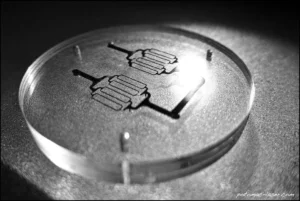 The Food and Drug Administration (FDA) awarded the University of Maryland Baltimore County (UMBC), Center for Advanced Sensor Technology (CAST), a 3-year grant for the commercialization of a microfluidic device for Rapid bioburden detection in pharmaceutical production. Potomac Photonics was selected as a sub-contractor to focus on the design, scale-up and manufacturing of the microfluidic bioburden detection cassettes.
The Food and Drug Administration (FDA) awarded the University of Maryland Baltimore County (UMBC), Center for Advanced Sensor Technology (CAST), a 3-year grant for the commercialization of a microfluidic device for Rapid bioburden detection in pharmaceutical production. Potomac Photonics was selected as a sub-contractor to focus on the design, scale-up and manufacturing of the microfluidic bioburden detection cassettes.
Sterility, also referred to as bioburden contamination, is a big concern in biopharmaceutical manufacturing. The cost of contamination is tremendous, and preventing it requires strict control of the possible entry points. A single incident of contamination can result in loss of batch product, production time, and resources, including a complete shutdown of the facility.

Extensive quality assurance and quality control protocols are often what maintain the Good Manufacturing Practices and keep regular track of threats of bioburden in the pharmaceutical product. These protocols usually employ cell culture-based systems where a typical culture plating takes 24-72 hours, which may be inadequate for certain pharmaceutical products. If bioburden detection is prolonged, it can cause delays in production and/or closure of the facility, resulting in loss of ability to deliver product to patients as well as a loss of commercial revenue. There are many pharmaceuticals that inherently cannot be sterilized by the traditional methods, e.g. live viruses (vaccines), living cells (blood, blood components, cell therapies), viral vectors (gene therapies), biomolecules such as DNA (gene therapy), and proteins (vaccines and therapeutics). So, much slower analytical methods must be employed, making these pharmaceuticals an ideal target for applying a rapid detection method. Additionally, there are a number of important products with very short shelf life (e.g. radioactive products) that would strongly benefit from rapid methods for sterility. Our proposed project aims to commercialize a rapid on-the-spot microfluidic bioburden detection device capable of providing real-time bioburden data.
Potomac has significant experience in design and mass-production of microfluidic devices for biomedical applications. This effort will be led by the Potomac MicroFab Lab who, in concert with the Potomac’s Production Team, will help commercialize this technology for microbial bioburden detection and other Point-of-Care applications. Potomac Photonics Inc. specializes in various microfluidic device fabrication methods, with client services for feature sizes ranging from 2mm – 2mm, and provides a wide range of capabilities with high precision multiplexing options. Together with the UMBC and the FDA, Potomac Photonics will create cost-effective manufacturing solutions using thermoplastic devices, and provide a path towards seamless manufacturing.
Reference:
- Gurramkonda, C., Mupparapu, K., Abouzeid, R., Kostov, Y., Rao, G. (2013) Fluorescence-Based Method and a Device for Rapid Detection of Microbial Contamination. PDA J. Pharm. Sci. and Tech. 68, 164-171, doi: 5731/pdajpst.2014.00951
- Sterility problems are one of the most found problems during FDA inspections (https://www.fda.gov/downloads/Drugs/GuidanceComplianceRegulatoryInformation/CDERFOIAElectronicReadingRoom/UCM569851.pdf).


